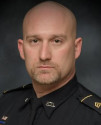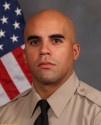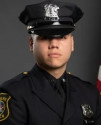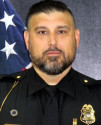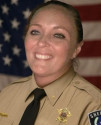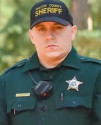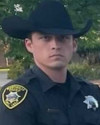Thomas Gay
Continuing Indian raids caused settlers on the upper Brazos, Trinity and Colorado rivers to petition the Congress of the Republic of Texas for help. On Sunday, May 26, 1839, Captain John Bird and Private Nathaniel Brookshire encountered three Indians skinning a buffalo and routed them, capturing one of their horses laden with meat. Around 9:00 a.m., a small party of Indians busily chasing a herd of buffalo and sighted the rangers at the supposedly abandoned Fort Smith.
At 1:00 p.m., Captain Bird and 35 rangers tried to catch up with the Indians who remained just outside of rifle range. The rangers charged, but to no avail, and decided to retreat. At that point the rangers were surrounded by 40 Indians. The rangers dismounted and walked their horses into the ravine (later named Bird's Creek). Private H. M. C. Hall persisted in remaining on horseback, and he was mortally wounded while dismounting on the bank.
Smoke signals were sent and 200 Indians arrived from the Comanche, Caddo and Kickapoo tribes. The Indians charged several times, but were repulsed by the rangers’ accurate fire. In the battle, Private Thomas Gay fell dead in the ditch from a rifle ball; Private Jesse E. Nash was shot and killed by an arrow; First Sergeant William H. Weaver was killed by a rifle ball to the head; and Second Lieutenant William R. Allen and Private George W. Hensel were severely wounded.
As the Indian fell back a second time, Captain Bird jumped up on the bank to encourage his men and was shot through the heart by an arrow launched by an Indian at the extraordinary distance of 200 yards. Just at dark Comanche War Chief Buffalo Hump and 12 warriors charged the rangers. The war chief was killed and the Indians withdrew. The rangers reported to have killed about 30-40 Indians and wounded about as many. The rangers secreted the bodies of Bird, Weaver, Gay and Nash in the ravine and carted off the three wounded rangers – Allen, Hensel and Hall. They reached Fort Smith about 2:00 a.m. on Monday, May 27. Private Hall died soon after reaching the fort. Several days later the rangers returned to collect the bodies. They were buried in one large crude coffin side-by-side on the banks of the Little River near Fort Smith.
The battle became known to Texans as “Bird’s Victory.” Very little is known about the 5 rangers except Bird. Bird was born in 1795 in Tennessee and was married with 4 children when he arrived in Texas in 1830. He had fought with Andrew Jackson in the War of 1812, against the Comanche in 1832 and the Mexicans during the Texas Revolution in 1836. Weaver was born in Mississippi and was about 21 years of age.
In 1936, two Texas Centennial markers were placed in Temple, Bell County, in honor of Captain John Bird, First Sergeant William H. Weaver, and Privates H. M. C. Hall, Thomas Gay and Jesse E. Nash.
Bio
- Age Not available
- Tour Not available
- Badge Not available
Incident Details
- Cause Gunfire
- Weapon Rifle
- Offender Not available
Most Recent Reflection
View all 15 ReflectionsGAY, THOMAS -- On applying for land in Austin's Colonies, Mr. Gay stated that he was born in 1805 and had arrived in Texas from Georgia in May, 1830. He received a league of land in Austin's Second Colony. He was issued Headright Certificate for one labor of land by the Washington County Board, January 15, 1838.
Mr. Gay was a member of Captain Moseley Baker's Company at San Jacinto and on January 19, 1839, was issued Donation Certificate No. 759 for 640 acres of land for having participated in the battle. He enlisted July 14, 1836 for six months in Captain Orson Shaw's Company.
In the Court of Claims files in the General Land Office it is shown that Mr. Gay in 1839 was a member of Captain William G. Evan's Company, stationed at the Falls of the Brazos. He and three or his companions while serving under Captain John Bird, were killed in an engagement with Indians on Bird Creek near where the city of Temple, Bell County, now stands, on May 26, 1839. Horatio Chriesman was appointed administrator of his estate in Washington County March 1, 1842. He was survived by his widow, Mrs. Eleanor Gay.
Richard E. Helmer, III
Great, Great Grandson
June 24, 2019





